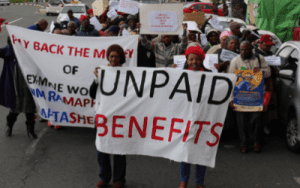Popular education for workers in South Africa
 Since 2009, Union Aid Abroad – APHEDA have been partnering with Workers’ World Media Productions (WWMP) in South Africa on a Labour-Community Media Project which aims to provide “quality, relevant and informative media productions and access to the media for the labour movement and working class people.”
Since 2009, Union Aid Abroad – APHEDA have been partnering with Workers’ World Media Productions (WWMP) in South Africa on a Labour-Community Media Project which aims to provide “quality, relevant and informative media productions and access to the media for the labour movement and working class people.”
Evolution of Mass Popular Education
The long anti-apartheid struggle was behind the growth of robust mass popular education via joint union-community media, using radio in a variety of languages to reach working women and men in disadvantaged communities. WWMP used radio to introduce key issues including access to quality education; health, transport and housing; HIV; gender-based violence; minimum wages; workplace health; rights to land, water and electricity; corruption; social security and other issues relevant to workers and urban and rural poor across the country.
Income Inequality and Employment
Against a backdrop of sustained income polarisation – with Blacks (around 90% of the population) earning on average AU$400 per month and Whites earning four times that – Unions are demanding a minimum wage of AU$500 per month. Out of a population of 58 million, less than 10 million are in the formal sector, with full or part-time jobs, and 6 million are in the informal economy or have seasonal jobs in agriculture. Each wage must support a large number of people.
WWMP seeks to raise awareness of this situation using various media platforms. They aim to “develop a participatory labour movement that uses radio, television, print and social media… to ensure that the trade union movement and civil society… is strengthened, informed, mobilized and organised to respond to socio-economic and political challenges…”
The South African Union Movement and WWMP
Despite rising struggles against poverty across the country, the main union federation COSATU split in 2014 over its political relationship to the ANC government. The new South African Federation Trade Union (SAFTU), based on the strong Metalworkers’ Union (NUMSA), now has 800,000 members.
WWMP sees levels of grassroots community organisation, struggles and leadership as still relatively. Desperation leads to rebellions in townships and campuses, schools and workplaces, but without strategy. The majority of participants are new to organising and are taking up issues in a collective manner, with little organisational experience and limited political awareness and leadership skills.
WWMP aims to support the development of democratic, united and independent grassroots organisations of working class people. Neo-liberal policies have undermined capacities to build independent organisations, with people being in a constant survival mode, having very little leisure time or their own resources to organise themselves.
WWMP’s Recent Achievements
In recent years, WWMP have taken a community-based approach in poor and marginalised communities in the form of Labour Community Media Forums (LCMFs), mass education, advice centres, accredited media skills training to unemployed youth, leadership training and the organising of marginalised groups of workers.
Key initiatives include:
- Maintained weekly thematic radio shows on working class issues in five languages on over 30 community radio stations across the country and the English language channel public broadcaster, SAFM. SAFM has received awards for the “Workers on Wednesday” show, now in its 12th year and season. SAFM has a listenership of over 650,000 that includes leaders of trade unions, government and business.
- Run a Labour TV “Workers’ World” show for one hour, broadcast three times per week on local network in the Greater Cape Town area and the commercial satellite TV channel nationwide, with a regular weekly audience of 100,000 viewers.
- Produced a multilingual monthly online newspaper, Elitsha, covering workers’ rights issues, and a weekly e-news received by over 4000 activists and leaders.
- Run six-month accredited media training courses for 15 young learners who are either unemployed graduates or union, community and NGO activists.
- Associated with the committees running the radio programs, 18 locally based LCMFs have been consolidated; along with Labour Community Advice Media and Education Centres (LAMECs) in three key areas: Khayelitsha, East London and Alexandra (Johanesburg) townships.
Helping Workers Organise and Form Unions
WWMP has been assisting unorganised workers to organise and join unions. Community care workers have been treated as unskilled volunteers rather than vitally important workers, and are threatened by government outsourcing to high profit anti-union companies. Community care workers have now formed their own trade union, the National Union of Care Workers of South Africa (NUCWOSA) launched in 2016. WWMP developed and ran new shop-stewards’ training and leadership courses in several communities reaching hundreds of shop-stewards and leaders of marginalised workers in the formation period.
“As care workers we provide a valuable service to our communities and society at large yet we are suffering with several problems… We deserve to be treated like professional healthcare workers. Like all other workers, we need and deserve a living wage and decent working conditions.” NUCWOSA Brochure
Looking Forward: 2019 Elections and Beyond
On 8 May 2019, South Africa will hold national elections. As in the past, WWMP will play an independent role in educating people in working class and poor rural communities about voting rights and issues. WWMP will continue their work broadcasting television and radio programs, using the local committees, the production of the Elitsha monthly online newspaper, and expand the advice centres. WWMP will continue to provide training to delegates and officers of existing and emerging unions.
More: Workers’ rights programs on South African radio and TV